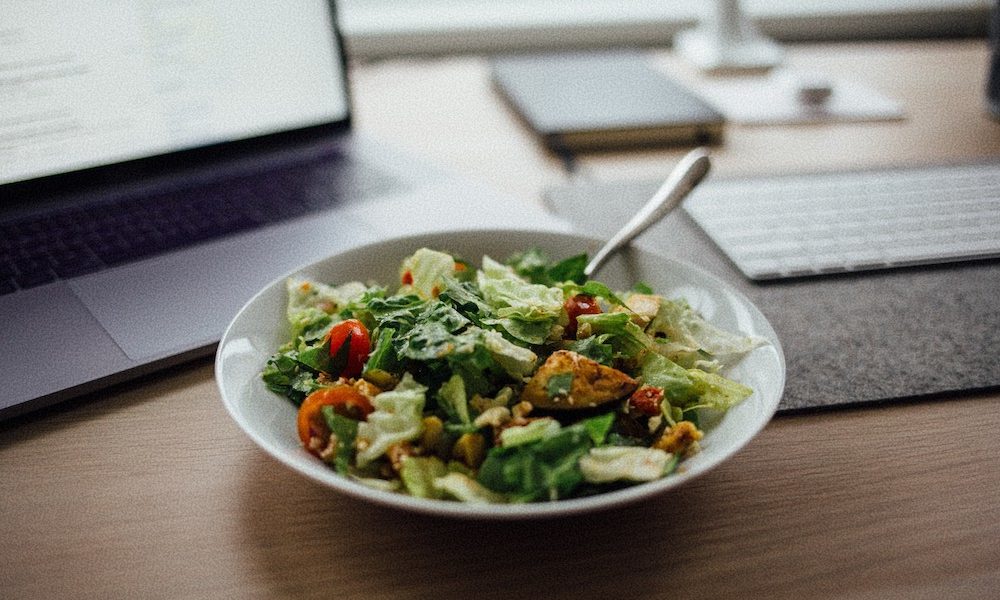How you eat and care for yourself on the regular can make a huge impact on your workdays. Here’s what you need to do get to the top of your game.
BY: JENNA GORHAM, RD
Do you often feel an afternoon slump? Do you start to feel a drop in your energy around two or three o’clock? Keeping energy levels up throughout the workday can be challenging for many busy people.
There are many reasons you may feel the afternoon slump despite your attempts of running on caffeine. It could be stress-related, a lack of sleep, limited exercise, boredom, and even your food choices.
But wellness is a cycle. Sleep, stress, nutrition, fitness, mental health – they’re all connected. When we take care of ourselves in one area, we tend to take better care of ourselves in other areas too. The opposite is true, too. When we neglect one area, other areas can fall by the wayside.
One of the first things to go during a busy work day is eating.
How often do you have such a busy day that you forget to eat lunch? Or maybe you rush out the door in the morning without making time for breakfast.
Skipping meals is common as people get caught up in meetings and to-do lists all day long. Here are some nutrition tips to keep in mind to help boost your energy for your workday.
1. Get enough fuel throughout the day.
Your brain needs a constant supply of glucose and fat to run efficiently. Glucose (sugar/carbohydrates) is used for a quick source of energy and is the brain’s preferred source of energy. Fat, on the other hand, provides a more sustained source of energy because our bodies digest it more slowly. Because fat provides the most energy per gram (compared to carbs and protein) it goes to the most important organs, the brain and heart, first before tackling its other responsibilities.
When you don’t eat enough, whether it’s through skipping meals or restricting your intake, your body doesn’t get fuel it needs. Your body then has to work harder to conserve the energy it has, which can make you feel tired. On the other hand, overeating can also make the body work harder to break down excess food, which can also make you feel lethargic. That’s why fueling in a consistent, balanced way can help you sustain your energy throughout the day.
Start by eating something for breakfast, as it helps set the tone for the whole day. Even if it’s an energy bar as you run out the door, a banana in the car, or a yogurt at your desk – give your brain a boost of energy right off the bat.
By mid-day, make time for lunch. This does not need to be an elaborate sit down meal (although actually taking a break and clearing your mind can also improve productivity). Do whatever you have time (or make time) for: pack peanut butter crackers, an apple and string cheese, a sandwich, or leftovers for something easy to keep you fueled.
2. Stay hydrated.
Being dehydrated can make you feel tired, cause headaches, and even impact cognition. Keeping a water bottle with you throughout the day can help prevent this! Those who naturally sweat a lot or those who live in warmer climates may require more water. Aim for at least eight, eight-ounce glasses per day. If you don’t like water, try sparkling water, flavored water, or add your own fresh or frozen fruit.
3. Limit alcohol.
Alcohol decreases the effectiveness of neurotransmitters and blocks oxygen from getting into cells. While research is inconclusive on how alcohol consumption affects brain health long term, a 2017 study showed that those who drink, even moderately, have smaller hippocampi than non-drinkers. Drinking can also affect sleep quality, which is huge for productivity.
4. Use caffeine wisely.
Current science shows that we can safely consume three to four cups of coffee per day. However, caffeine affects everyone differently, and research is inconclusive on how it affects long term health. Caffeine can temporarily enhance your memory, alertness, and cognitive function, but it also suppresses your appetite.
When you’re feeling tired and reach for another cup of coffee, your body may actually be asking for fuel. Sometimes a snack or meal is really the boost of energy your body needs. When the caffeine wears off, you often still feel tired and possibly even more hungry. Furthermore, caffeinated drinks often carry added ingredients, like cream, sugar, and artificial sweeteners which can spike your blood sugar and energy temporarily, but cause a crash in energy shortly after.
5. Choose a balanced, whole-food diet.
When we feel the afternoon slump, we often grab conveniently packaged snacks that may leave us feeling more hungry. By combining snacks you crave with another food group or a good source of fiber, protein, or healthy fat, it can help slow the digestion, stabilize your blood sugar, and boost your energy.
Choose carrots and hummus, whole grain crackers and guacamole, cheese and apple slices, or high protein Greek yogurt with berries. They key is to combine two food groups for a more filling, satisfying, and nutritious snack.
Stay mindful of how you fuel your mind, and you’ll be at the top of your work game in no time.
Adapted from the original article.
HEADER IMAGE: NIELSEN RAMON
Jenna Gorham, RD is a registered dietitian nutritionist based in Bozeman, Montana focused on helping 20-somethings improve their health by making healthy eating easy. By emphasizing nutrition is more than the latest fad diet and trend, Jenna bridges a better understanding of the body’s needs with simple, long-lasting lifestyle habits that help others achieve the best health.

